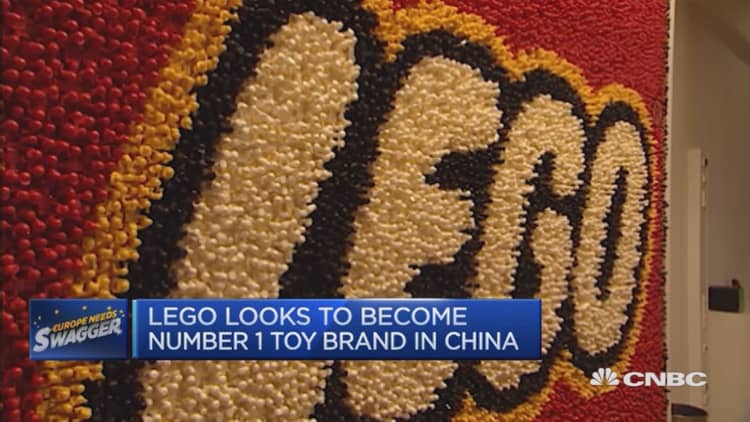



Lego CEO Jorgen Vig Knudstorp has told CNBC that China offers "a unique opportunity for growth," claiming that his firm is well-positioned to become the country's number one toy brand.
His comments come as the Danish toymaker prepares to step up its operations in China. Lego will open its largest retail store in the world near Shanghai later this year and is due to complete work on its first Chinese factory in 2017.
The toymaker faces a myriad of challenges as it tries to grow sales in the world's second-largest economy. Lego sparked controversy back in 2015 when it refused to sell in bulk to dissident Chinese artist Ai Weiwei, with critics accusing the company of not wanting to wrong-foot the Chinese government.
Rebuffing those claims, the Lego CEO gave his explanation for why Ai Weiwei's original sales request was denied, saying: "We've seen people building concentration camps out of Lego and pictures of the Prophet Muhammad."
"We noticed a huge sensitivity to so-called 'political topics' and in this case one of our staff members in Australia found the purpose suggested by Ai Weiwei was too sensitive and so the order was refused," he added.
Lego has since changed its policy and no longer requires customers buying in bulk to specify how they're going to use their bricks.
Political sensitivities aside, Lego is aware it needs to bridge cultural divides to gain market share in China. A key part of Lego's appeal for western parents is its educational value. However, the concept of "learning through play" isn't so well-established in China.
In a bid to change attitudes, the Lego Foundation is pouring millions of Danish krone into research focusing on the cognitive benefits of play. The foundation funds "Lego professors" and is partnering with a leading Chinese university "to support creativity and play in Chinese schools," according to a press release in January.
As part of Lego's plans to grow sales in China and Japan, it's also updated its play kits to include more Asian characters and settings. Its revamped it "Ninjago" range - featuring dragons, ninjas and a tea-drinking sage.
Lego is aware, however, that small-scale product updates won't be enough to assure its success in China, one of the world's most advanced markets for online gaming. When asked if Lego would consider launching a virtual reality product, the company's CEO replied "absolutely".
While stressing that Lego's plastic bricks remain the company's core product, Jorgen Vig Knudstorp said he saw huge opportunities in developing the group's range of apps and mobile games. Lego's multifaceted approach to expanding into China helped it notch up double-digit sales growth in the country last year.





